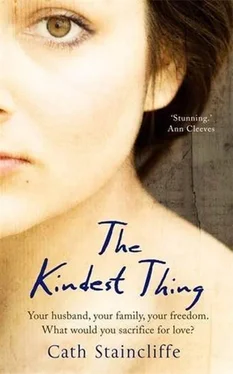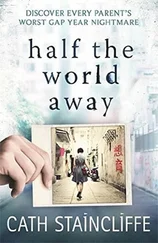The words won’t come.
He repeats the question.
There are wings beating in my chest and the chill of stone in my bowels.
‘Yes,’ I whisper.
‘Is there anything you wish to say?’
‘No.’
It was still light, the world gold-drenched with sunset when we arrived at the prison. I was stunned, a ball of static in my head that made it impossible to think clearly.
At the main gate, we were taken from the van one by one. The guards exchanged forms and I was asked to confirm my name and date of birth. The entrance to the complex was a big metal gate and gatehouse. Fences ran off either side, cream-coloured steel mesh topped with coils of razor wire.
A prison officer led me through to the reception area, unlocking and relocking a series of doors. There, I was met by two other officers, women. Again I had to give my name and date of birth.
‘Have you been to prison before?’ PO Vernon, asked me, various forms spread out in front of her.
‘No.’
‘Every time you enter or leave the prison we have to do a full search. Please put your clothes in the basket here. Socks and shoes in here. Your bag on the side there.’
My fingers trembled and I wanted to cry. I removed everything until I stood naked before them.
‘Now walk in a circle.’
I did. My face burning, my pulse quick and uneven. I was so thirsty. And horribly aware of the eyes watching.
Everyone was very matter-of-fact and workaday about this process because it was their daily work. But me, I was drowning. Anxiety prickled my every pore. I was hot with shame and stiff with apprehension. My muscles twitched and shivered without control.
One of the women moved to my clothes and looked through them, holding them up to the light of the window, checking seams and pockets, shaking them. Then she examined my shoes.
The officer told me I could get dressed and asked my dress size. They gave me a change of clothes – briefs, bra and T-shirt, tracksuit bottoms and sweatshirt. Casual, anonymous garb. When I finished, they asked me to sit down.
‘You get a towel and soap.’ PO Vernon passed them to me. ‘Do you need any sanitary supplies – Tampax or towels?’
‘No.’ It was two years since I’d had a period.
She poured the contents of my bag out on the table. ‘There are some items that are prohibited,’ she told me. ‘They will go on your property card and be kept for you, until your release.’
She set aside my mobile phone, money and credit cards, paracetamol and lip salve. ‘We can’t allow any cosmetics in,’ she explained. ‘Some of the women conceal drugs in them. You can buy some here once you’re settled.’
She also picked up the photograph of the four of us taken just before Neil got ill.
‘Why can’t I keep that?’ I asked.
‘Nothing allowed if it has your face on it. It could be copied, used to fake ID. You can have them send in some other photos from home. Everything will be checked before you get it.’
They let me keep my wedding ring.
‘Do you smoke, Deborah?’
‘No.’
She made a note on one of the forms.
‘Are you a drug-user?’
‘No.’
‘Are you currently on any medication?’
‘No.’
‘Do you have any existing medical conditions?’
‘No.’
‘Do you suffer from any of the complaints on this list?’
She passed me a sheet, which I read through. It reminded me of the permission slips we had to fill in for the children’s school trips. Asthma, diabetes, epilepsy.
‘Sign here for the property we’ve taken.’
I wrote my name.
PO Vernon held out a plastic card to me. ‘This is for the phone. There’s two pounds’ credit already on it. You can make a brief call to let your family know where you are.’
They took me through, locking and unlocking doors, and across the grounds to another building. There I waited behind two other women until I could use the phone. It was noisy: there were lots of women milling about, talking loudly, snatches of raucous laughter. People were glancing my way, a new face. I felt disoriented, shaky and exposed.
Adam answered the phone. ‘Mum?’
‘Adam, I’m… erm. Listen, love, I want you to call Grandma, okay? Ask her to come over.’
‘Why? Where are you? Are you still at the police station?’
‘I’m in prison, in Styal.’
‘Fuck. Why? Because of Dad?’
Did I even answer his questions? I don’t know.
‘Is Sophie there?’
‘She’s in the shower.’
Disappointment weighed me down. I longed to hear her voice, picture her disconcerted but determined to manage. It probably wasn’t fair but I was hoping she would make me feel better. ‘Tell her I’m fine. You both look after yourselves. And will you ring Jane and explain to her? The number’s on the thing in the kitchen.’
‘Mum, it’s going to be all right, isn’t it?’ Was he trying to reassure me or asking me? ‘How long are you going to be there?’
‘I don’t know. I have to go to court in the morning. They might give me bail. I’d better go now. I love you.’
I was still in shock. People had to repeat things to me before I grasped what they were saying. My knees were weak and I worried that I might throw up, though there was nothing much to throw as I hadn’t managed to eat anything for hours.
As a novice, I was put into a special unit called the First Night Centre. It was designed to give new prisoners extra care and support but I was so bewildered to find myself locked up that I was unable to pay much heed to such distinctions.
I shared a room with a slight, dark-skinned woman who spoke no English. I don’t know where she was from, Africa perhaps. When I made attempts to find out her name, she just shook her head. We spent the time silent, each in our own cocoon of despair, numb and unresponsive. Everything around us was out of proportion, escalated like in a fever. The level of noise was debilitating: the hard surfaces amplified the sound of chairs scraping, gates clanging, coughs and shouts and canned television laughter. The smells, of women and food and unfamiliar toiletries, were overpowering. The ceilings were too low, the lights brash, the colours sickly and unsettling. When I touched the plastic chair in my room, an electric shock bit my fingers.
If they’d employed me I could have shown them how to use natural materials to absorb the sound and vibration, reduce the amount of static. Soften the lighting with daylight bulbs to give an easier spectrum, less tiring for everyone. Pick colours to soothe the eyes and ease the emotions.
The day after, I appear in the magistrates’ court. There are three people sitting at the bench. I confirm my name and address and date of birth. The charge is read out and my solicitor says I am not entering a plea. She asks them to consider bail. The magistrate in the middle looks to her colleagues and a couple of whispers are exchanged. Then she straightens up, presses her lips together briefly before replying. ‘Given the seriousness of the charges involved we will not be granting bail. The accused will be held on remand until the preliminary hearing next week.’ They send me back to prison.
So today, nine months after, I am being tried in the Victorian Court at Minshull Street Crown Court. There are two Crown Court buildings in the city. This one’s not far from Piccadilly station. Handy for spectators, if popping into town for a shot of criminal justice is your thing.
As the name implies, it’s a traditional set-up: a raised gallery for spectators, dark wood benches and panelling, a high, vaulted ceiling. The combination of pomp and circumstance that the Victorians loved and their careful workmanship. You can see evidence of that in the carvings on the ends of the benches, the crest with the lion and the unicorn high on the back wall.
Читать дальше












